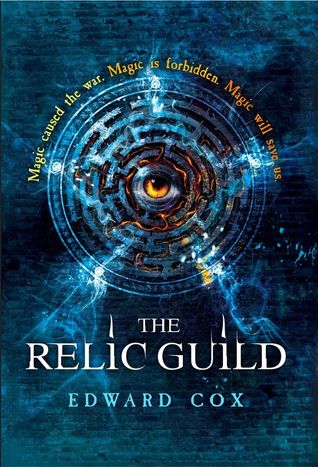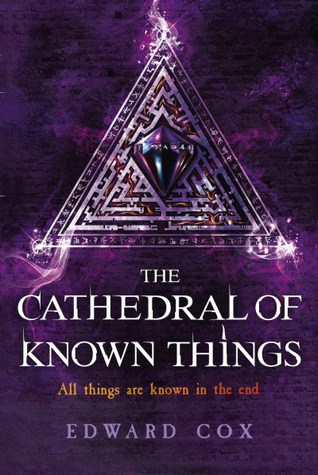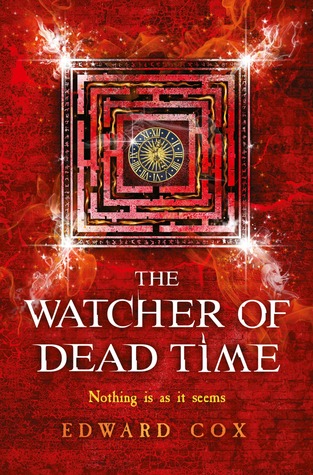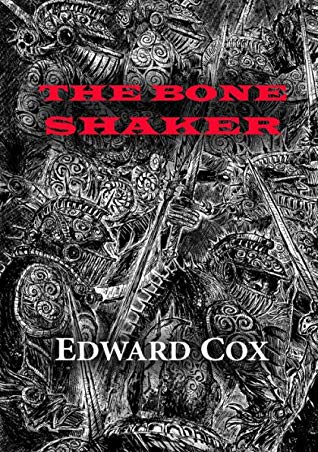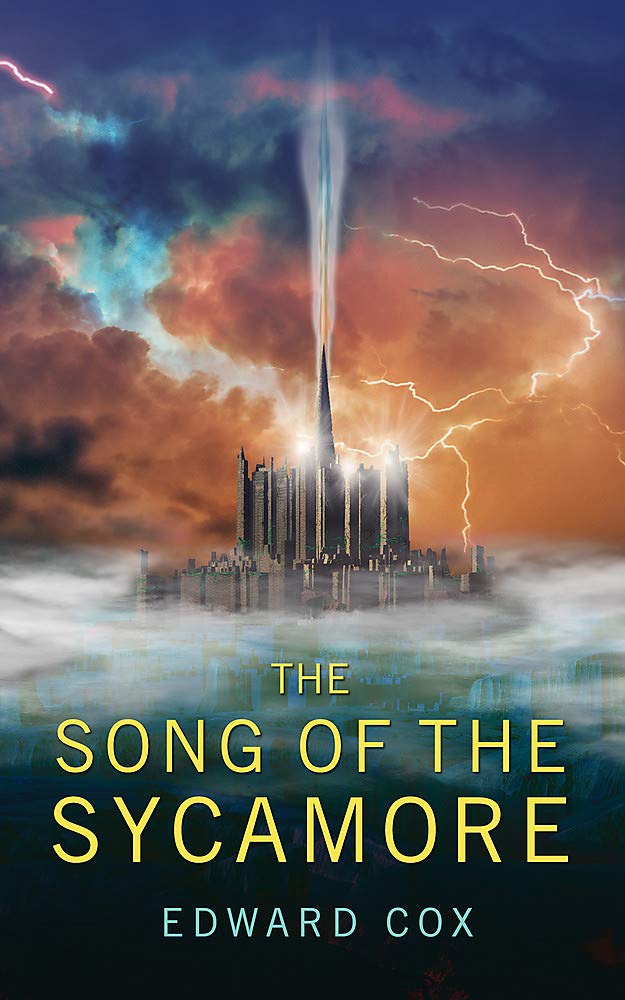Author Spotlight: EDWARD COX
Edward Cox is the ‘Gemmell Award’ nominated author of The Relic Guild trilogy (THE RELIC GUILD, THE CATHEDRAL OF KNOWN THINGS and THE WATCHER OF DEAD TIME).
Edward began writing stories at school as a way to pass time in boring lessons. It was a hobby he dabbled with until the late 80’s when he discovered the works of David Gemmell, which not only cemented his love of fantasy but also encouraged a hobby to become something much more serious.
Edward currently lives in the English countryside, where his wife and daughter defend him from the daily attacks of giant spiders. When he is not sleeping or eating, he likes to pretend to be a ghost, but has, as yet, failed to convince anyone. His favourite pastimes include reading, punching clocks, and dining out on winning the 1987 national roly-poly championship.
Welcome to the Hive, Ed. Let’s start small: tell us about a great book you’ve read recently!
Hello! Well, I’m currently reading Empire of Grass by Tad Williams, which is the second book in his The Last King of Osten Ard trilogy. Williams is a big writing hero of mine, and a huge influence. His Memory, Thorn and Sorrow series was a real epiphany, playing an important part in developing my understanding of storytelling. That he has returned to that world with his new books is an exciting prospect and a joy to read.
Also, I’ve read a few great books coming out this year from my publisher Gollancz. Off the top of my head, I’d mention Shadows of the Short Days by Alexander Dan Viljalmsson and Smoke in the Glass by Chris Humphreys. Elsewhere, Jen Williams’ Winnowing Flame is a brilliant series, as is Darksoul by Anna Stephens.
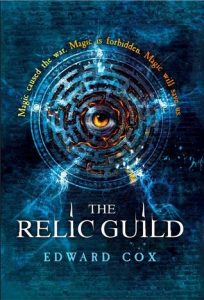 Excellent recommendations. Okay, time to escalate things: reality warps and you suddenly find yourself leading a D&D-style party through a monster-infested dungeon. What character class are you, and what’s your weapon of choice?
Excellent recommendations. Okay, time to escalate things: reality warps and you suddenly find yourself leading a D&D-style party through a monster-infested dungeon. What character class are you, and what’s your weapon of choice?
Ooh, Warlock for sure. I loved it when this character class came in. You get the coolest looking armour, a grand choice of weapons (I always go for a big-ass magical mace), plus you can access strange, eldritch spells that aren’t like the other magic in the books. Also, Warlocks are dark enough that I never feel bad for using anyone as cannon fodder. But shhhh, don’t tell the others.
Your eldritch secrets are safe with us Ed! When you’re not trawling through dungeons, how do you like to work? (In silence, with music, or serenaded by the damned souls of a thousand dead shrimps? Do you prefer to type or to hand-write? Are you an architect or a gardener? A plotter or a pantser? D’you write in your underwear, or in a deep-sea diver’s suit?) Tell us a little bit about your writing method!
I write standing up. I don’t know if that’s odd or if anyone else does it. [We have it on good authority Anna Stephens does] Always listen to music while I work, usually something atmospheric like Tangerine Dream or David Sylvian. I’d say I’m a plotter and a pantser both. My notebooks are like records of the secret conversations I have with my stories, where we discuss ideas and pitfalls, and what it all means. My writing day always starts with scribbling away in a notebook. Then I work on a laptop, and that’s where the real pantser chaos begins. I often think novel writing is like falling down stairs for a whole year, then getting up at the end with a surprising lack of broken bones.
Sounds dangerous. What (or who) are your most significant fantasy influences? Are there any creators whom you dream of working with someday?
I’ve already mentioned Tad Williams. Neil Gaiman was also an influence, along with writers who are sadly no longer with us, like Angela Carter. It’s a long list, I guess. In truth, I can find inspiration in all things: TV and movies, conversations, dreams, lying in the bath, a single line from a novel – whatever it is always works for fantasy and any genre. I don’t really understand what triggers ideas and inspirations in my brain, but I’m sort of in love with the mystery of where it all comes from.
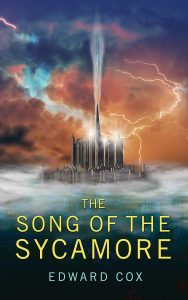 Of course, some influences are more obvious. I have two books out this year. The first is The Bone Shaker (NewCon Press, June 18th) which is a love letter to stories that moved me: the D&D campaigns, the tales of Tad Williams and David Gemmell – an homage to all the adventures I grew up devouring.
Of course, some influences are more obvious. I have two books out this year. The first is The Bone Shaker (NewCon Press, June 18th) which is a love letter to stories that moved me: the D&D campaigns, the tales of Tad Williams and David Gemmell – an homage to all the adventures I grew up devouring.
The second book is The Song of the Sycamore (Gollancz, August 22nd). Inspiration here comes from many places: the story of Orpheus, the Egyptian myth of the sycamore, plus the Dying Earth sagas and the “science fantasy” stories I read over the long years. I’ve always been fascinated by wastelands, especially those formed from the ruins of millennia upon millennia of civilisation. It all gets mashed up as fertiliser for the story I want to tell.
As for collaboration, I like the prospect of it, but I’m not sure I’m a good author to collaborate with. I’ve done it a couple of times in the past, and I was pleased with the results, but I take a long time to write fiction (The Song of the Sycamore, for example, took me over two years) and I become obsessed with my own ideas to the point where I’m probably better left alone. Having said that, it’s been my privilege to make friends with many authors over the years, and I’d be proud to try collaborating with any number of them. Never say never.
What was the last thing you watched on TV and why did you choose to watch it? Alternatively, what games have you enjoyed recently?
My game is Skyrim, which I’ve been playing for the last billion years and I don’t think I’ll be reaching the end any time soon. Marvellous game!
For TV, I’ve been horrified and fascinated by Chernobyl. It’s so well done. I was fifteen when the real disaster happened, and it terrified me. I honestly believed it would bring about the end of the world. It’s a strange coincidence that the TV show should air now. We talked about influences earlier, and yet another that went into The Song of the Sycamore is my memory of Chernobyl. In the novel, a city-wide catastrophe begins a chain of events which threatens an entire world. Of course, magic and monsters play a part, but my memory of the Chernobyl disaster is right there in the story’s foundations.
We used to love playing Skyrim! Then we took an arrow to the knee.
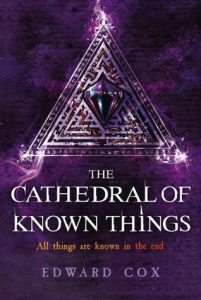 The world shifts, and you find yourself with an extra day on your hands during which you’re not allowed to write. How do you choose to spend the day?
The world shifts, and you find yourself with an extra day on your hands during which you’re not allowed to write. How do you choose to spend the day?
Giving myself permission to not write and without guilt is a fabulous idea! Okay, assuming this shift in the world makes the impossible possible, I’m visiting the strange and fantastic realms from all my favourites books: ride sandworms across the deserts of Arakis, search for Sithi in Aldheorte Forest, defend Dros Delnoch alongside Druss the Legend – oh my, imagine the possibilities! But if the shift doesn’t make the impossible possible, then eating crisps and playing Skyrim till I get a migraine.
Can you tell us a little something about your current work(s) in progress?
Well, the novel I’m currently writing is a bit of a secret project, so I can’t say much except that it’s fantasy. Readers can expect monsters, magic and mayhem on a complicated world where a cast of characters fight to get out of a situation they really don’t want to be in. I’m very much enjoying writing this one. It’s a little different for me, in process and story line and world, but so far it’s working. Which doesn’t give you much, so… It has a character in it called Bek Rana. There, that’s a world exclusive for you – hah!
You heard it here first guys! What’s the most (and/or least) helpful piece of writing advice you’ve ever received?
Least helpful? Give up writing. In fact, I was told, “…the very idea of you becoming a writer is a little like chasing rainbows.” That comes from a critique of my short story by an acquaintance of a friend who edited a magazine, and it was probably the kindest thing his letter said. The story was likely awful, but it turned out the guy who wrote the critique was a bitter and angry person who thought everyone was below him. I was young and naive at the time, but fortunately I was also tenacious, otherwise I might’ve believed what he said and followed his advice. Important lesson: we all have to start somewhere, so don’t give up.
Most helpful probably came from the poet Keith Jebb, who was my senior lecturer on a creative writing degree. He asked me why I was doing the degree. I told him that I wanted to improve as a writer by understanding where I was going wrong. You see, I’d told him I’d already been published, but where magazines had bought a few of my stories, I’d written others which no one would give the time of day, and I didn’t know why because, to my mind, they were decent efforts.
Keith advised me to stop questioning, as he didn’t believe I’d ever discover an answer. And I liked that. What he said struck a chord and I took it heart, rely on it to this day, in fact. Because not every idea will extrapolate into a great story, and even if it did then maybe submissions timings are wrong and the editor already accepted a story like yours just this morning. Or maybe the planets haven’t aligned properly. Maybe you can’t see the story is plain crappola. There are very many reasons why a piece does or does not achieve publication, some of them out of your hands. It’s better to focus on getting the story right, crafted to the best of your abilities, before considering where to send it. The thing to worry about first and foremost is the thing itself. Always.
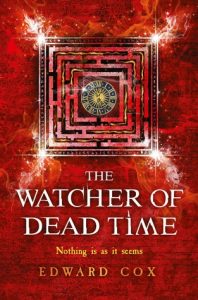 Every writer encounters stumbling blocks, be it a difficult chapter, challenging subject matter or just starting a new project. How do you motivate yourself on days when you don’t want to write?
Every writer encounters stumbling blocks, be it a difficult chapter, challenging subject matter or just starting a new project. How do you motivate yourself on days when you don’t want to write?
By writing. I’m one of those authors who likes to write every day. I tell myself I have to, even by force, because it takes me so long to finish a story. This is not an advisable or healthy method; I’m too hard on myself and not good at taking the important time to reset my brain at the end of the week. However, when I have to force myself to write there always come a point where the process clicks into gear and something good comes out of the work. Even if it’s an understanding of why that work is an intolerable pile of shite and where it went wrong. Of course, the healthier option is always to walk away and come back later.
If you could visit any country at any point in history, where/when would you go, and why?
East Germany during the Cold War. I have a fascination with the place, its formation, and all the events that led to the wall coming down. A reoccurring theme in my work is isolation, social conditioning, forms of panopticism like the Stasi enforced. Admittedly, there are happier times and less scary places I could visit, so maybe I’d have to go as an unseen ghost, mingling with the populace, listening in on secret conversations, to better understand how it truly was. I’d like the experience but not the hardship. If anyone’s interested in this period, I’d heartily recommend Stasiland by Anna Funder.
Tell us about a book that’s excellent, but underappreciated or obscure.
Well, I’m not sure I’m an authority on what’s under appreciated or obscure nowadays, but it seems to me that A City Dreaming by Daniel Polansky should have made a bigger noise. It’s a portmanteau novel set in the magical underbelly of modern day New York. It’s surreal, intriguing, innovative, plays around brilliantly with fantasy tropes, and I can’t recall reading anything like it in the last ten or fifteen years, if ever! So, yeah, go and show that some love.
Sounds interesting! Finally, would you be so kind as to dazzle us with an elevator pitch? Why should readers check out your work?
Mystery and intrigue. Monsters, magic and mayhem. Adventures that’ll keep you turning pages well after bedtime. Worlds that will dazzle your eyes, characters you’ll love or hate, and tension stronger than that time you were stuck on a train with no functioning toilet! What I do is a little bit special, but don’t take my word for it. Pick up a book or find out more on my website where you can sign up to my newsletter.
Ooh, I need a lie down after that. Thank you for having me.
Thank you so much for joining us today Ed, and good luck with your new release!
Edward Cox is the author of THE RELIC GUILD trilogy and THE BONE SHAKER. His latest novel, THE SONG OF THE SYCAMORE, will be released tomorrow!

